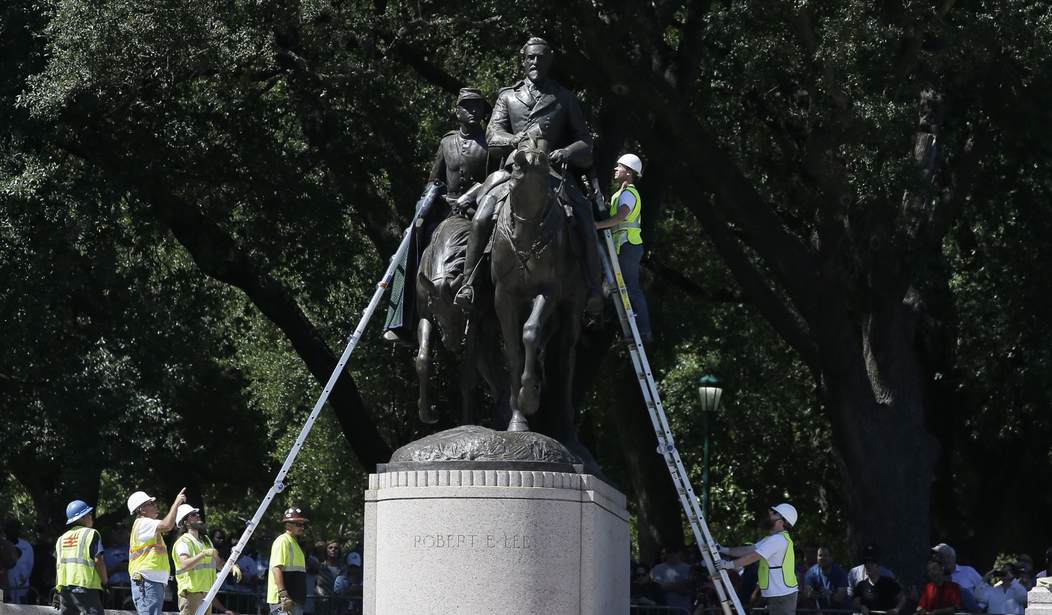First, they came for the Confederates. And that purge is far from over.
Jefferson Davis Highway in Arlington, named for the president of the Confederacy, has been re-christened Richmond Highway.
An Arlington group is calling for the removal of Robert E. Lee's name from Lee Highway to be replaced by "Mildred & Richard Loving Avenue." The Lovings were an interracial couple who challenged and helped overturn Virginia's anti-miscegenation law in the Warren Court.
This month, the statue of Gen. Thomas J. "Stonewall" Jackson was removed from the campus of Virginia Military Institute, where Jackson taught before leading Confederate troops at the First Battle of Bull Run.
Jackson would die of friendly fire after his victory at Chancellorsville in 1863. Had he been with Lee at Gettysburg, two months later, that most decisive battle of the Civil War might have had a different outcome.
But the cultural-Marxist revolution has moved far beyond Davis, Lee and Jackson. Out west, it is Abraham Lincoln's turn.
A renaming committee of the San Francisco school district wants the Great Emancipator's name removed from Lincoln High School for crimes against Native Americans.
Our 16th president ordered the Navajo tribe off their Arizona lands into New Mexico, resulting in a forced march of 450 miles. He approved the hanging of 38 Dakota Indians who had fought in the Dakota War in Minnesota in 1862, the largest mass execution in U.S. history.
Lincoln's Homestead and Pacific Railway acts led to the loss of large swaths of tribal lands.
Recommended
Other names to be removed from San Francisco schools include those of George Washington, Herbert Hoover and Sen. Dianne Feinstein. In 1984, Mayor Feinstein allowed a Confederate Battle Flag to be flown at City Hall.
As one looks down the list of greats whose statues are to be pulled down and names removed from public buildings, there seems to be a single common great sin for which none can be forgiven.
The unpardonable heresy? Columbus, Washington, Jefferson, Madison, Monroe, Jackson, Polk, Lee, Teddy Roosevelt, Wilson and Lincoln disbelieved in the equality of all races, peoples, cultures and civilizations. And these men lived and acted in conformity with this disbelief.
Lincoln detested slavery but did not believe in social and political equality between the races. As he conceded to Stephen Douglas in one of their 1858 debates, "We cannot, then, make them equal."
Still, between 1789 and 1960, a republic led by those men, who preached but did not practice equality, built the greatest nation in history.
Ever victorious in war, with the mightiest manufacturing base and the highest standard of living on earth, America was by the day of JFK the envy of mankind.
Yet, since Jamestown in 1607, we had been governed by men who disbelieved in equality and disregarded the suggestion that, "All men are created equal."
That proposition first appeared in a Declaration of Independence written by a member of Virginia's landed aristocracy who owned scores of slaves and described the Indians against whom we fought as "merciless savages" in that same document signed on July 4, 1776.
For Lee, the dishonors do not stop. A Virginia history commission just voted to replace the general's statue in the U.S. Capitol with a statue of Barbara Rose Johns, a teenager who, in 1951, led a strike at her high school to demand the same benefits white kids were receiving.
Was Lee really the racist and traitor of his haters' depiction, deserving of the gallows rather than being honored for how he sought to sever the Union? Perhaps the last word should go to a president who still revered Lee as late as 1960, Dwight Eisenhower:
"General Robert E. Lee was...one of the supremely gifted men produced by our Nation. He believed unswervingly in the Constitutional validity of his cause which until 1865 was still an arguable question in America; he was a poised and inspiring leader, true to the high trust reposed in him by millions of his fellow citizens; he was thoughtful yet demanding of his officers and men, forbearing with captured enemies but ingenious, unrelenting and personally courageous in battle, and never disheartened by a reverse or obstacle. Through all his many trials, he remained selfless almost to a fault and unfailing in his faith in God. Taken altogether, he was noble as a leader and as a man, and unsullied as I read the pages of our history.
"From deep conviction, I simply say this: a nation of men of Lee's calibre would be unconquerable in spirit and soul. Indeed, to the degree that present-day American youth will strive to emulate his rare qualities, including his devotion to this land as revealed in his painstaking efforts to help heal the Nation's wounds once the bitter struggle was over, we, in our own time of danger in a divided world, will be strengthened and our love of freedom sustained.
"Such are the reasons that I proudly display the picture of this great American on my office wall."
Patrick J. Buchanan is the author of "Nixon's White House Wars: The Battles That Made and Broke a President and Divided America Forever."

























Join the conversation as a VIP Member